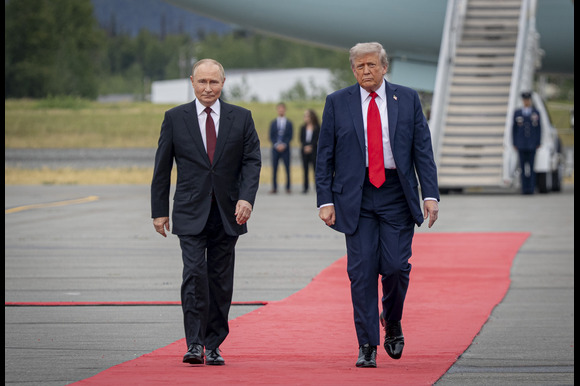US President Donald Trump has urged the European Union (EU) to impose tariffs of up to 100% on China and India in a bid to pressure Russian President Vladimir Putin into ending the war in Ukraine.
The call was made during a meeting between US and EU officials on Tuesday, where strategies to increase economic pressure on Moscow were discussed, according to a source familiar with the talks cited by the BBC.
Trump, who has repeatedly promised to end the conflict on “day one” of his presidency, is facing difficulties in brokering peace between Moscow and Kyiv as Russian strikes intensify across Ukraine. The US leader also told reporters that he plans to hold a call with Putin later this week or early next week. Both China and India are among the largest buyers of Russian oil, a vital source of revenue sustaining the Kremlin’s war effort.
In August, Washington imposed a 50% tariff on Indian goods, including an additional 25% penalty linked to India’s continued trade with Russia. While the EU has pledged to cut reliance on Russian energy, nearly 19% of its natural gas imports are still supplied by Russia. Should Brussels adopt Trump’s proposal, it would represent a significant shift from its current strategy of sanctioning Moscow directly rather than targeting its key trade partners through levies.
Trump’s request, first reported by the Financial Times, follows recent remarks from US Treasury Secretary Scott Bessent, who stressed that Washington was ready to escalate economic measures but required stronger backing from Europe.
Meanwhile, Ukraine continues to face heavy bombardment. Over the weekend, a Russian missile struck the main government building in Kyiv, an attack widely regarded as both symbolic and a major escalation. The strikes were part of the heaviest aerial assault on Ukraine since the war began, with Kyiv reporting that Russia deployed more than 810 drones and 13 missiles across the country.
On Tuesday, at least 20 civilians were killed in the eastern Donbas region when a Russian glide bomb hit a crowd waiting in line to collect pensions.
Speaking about the situation, Trump admitted he was “not happy with the whole situation” and warned that harsher sanctions against Russia could follow. Despite earlier threats and deadlines, the president has so far held back on imposing the tougher measures he promised, even as Putin continues to disregard warnings from Washington. A recent high-profile summit between the two leaders in Alaska ended without any breakthrough toward peace.
On trade, Trump also confirmed that negotiations between the US and India are continuing in an effort to resolve tariff disputes and reduce trade barriers. He announced that he plans to speak with Indian Prime Minister Narendra Modi in the coming weeks, expressing optimism about reaching a “successful conclusion” to the talks.
In response, Modi echoed the sentiment, describing the US and India as “close friends and natural partners” while reaffirming his government’s commitment to finalizing the discussions quickly. “Our teams are working to conclude these discussions at the earliest. I am also looking forward to speaking with President Trump,” Modi said.
The recent exchanges have been interpreted as a sign of warming relations between Washington and Delhi, following a collapse in trade negotiations earlier this year. Last week, Trump emphasized the enduring “special relationship” between the two nations, adding, “there’s nothing to worry about. We just have moments on occasion.”






